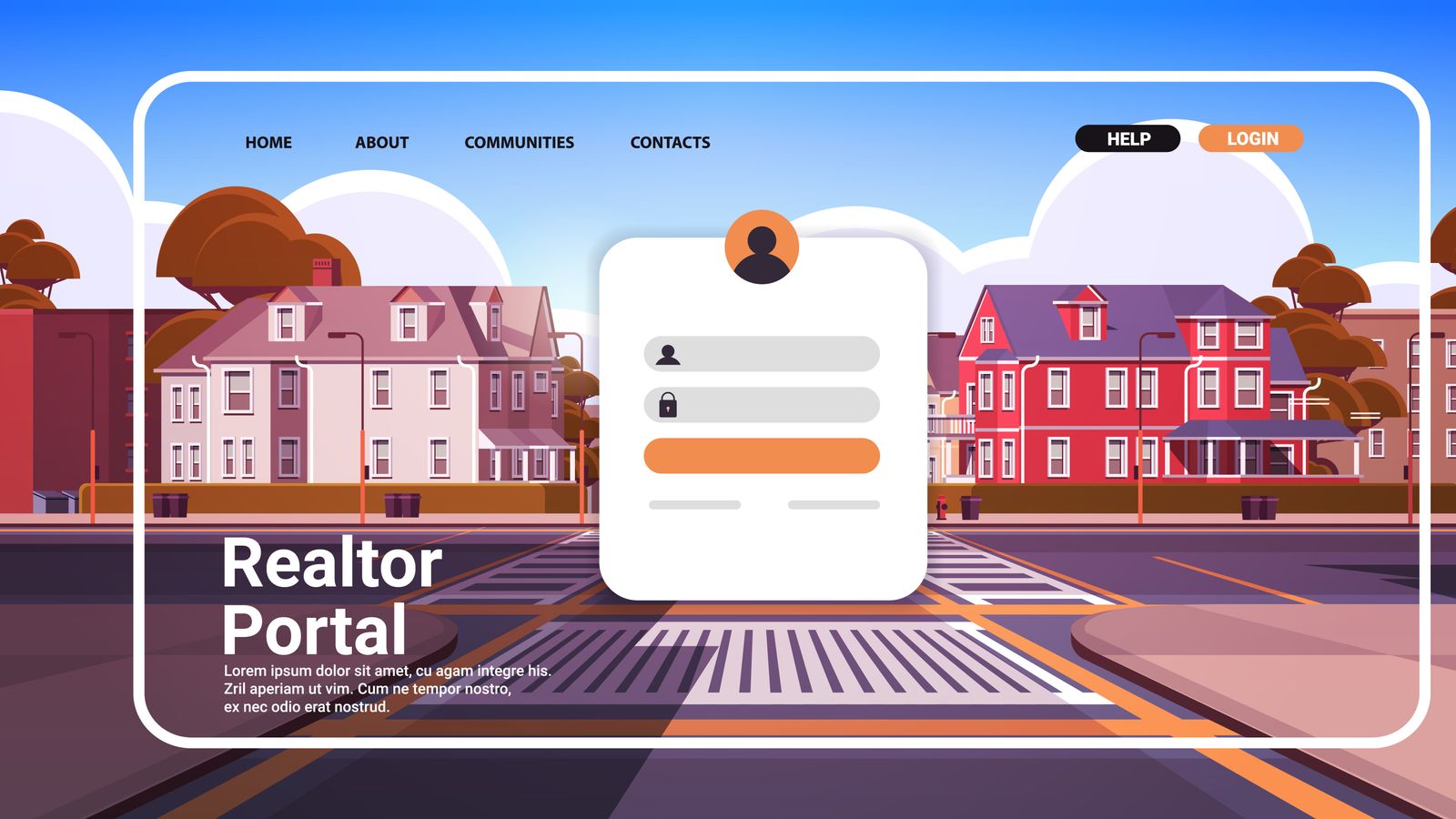Real estate agent personal website examples, features, and tips to help you stand out, attract leads, and build your brand online.
Branding & Design Lead Generation Seller Tactics Technology
In 2025, a personal website for real estate agents is essential. As more clients begin their home search online, agents are using personal websites to share information, showcase properties, and connect with potential buyers and sellers.
A personal website acts as a central location where a real estate professional can present their background, listings, and market updates. It is not part of a large real estate portal, but instead reflects the agent’s individual brand, personality, and local focus.
This article explores how personal real estate websites are evolving, which features to include on your website, and what layouts may match your goals. It includes examples, ideas, and practical tips for agents who are planning their own real estate website.
The Rise of Personal Real Estate Agent Websites
In the current digital environment, 100% of homebuyers now use the internet to find a house. Inevitably, this segment includes buyers and sellers who are searching for a real estate agent as part of their journey. A personal website allows agents to be found and evaluated on their own terms.
Unlike large real estate portals, which promote many agents and properties at once, a personal real estate website focuses on one professional. It includes their listings, market knowledge, and services. This format gives visitors a clear sense of who the agent is and what they offer.
Personal websites help differentiate agents by emphasizing branding, hyperlocal expertise, and direct contact options. This contrasts with third-party portals, which often route leads through generic systems or promote competing agents on the same listing.
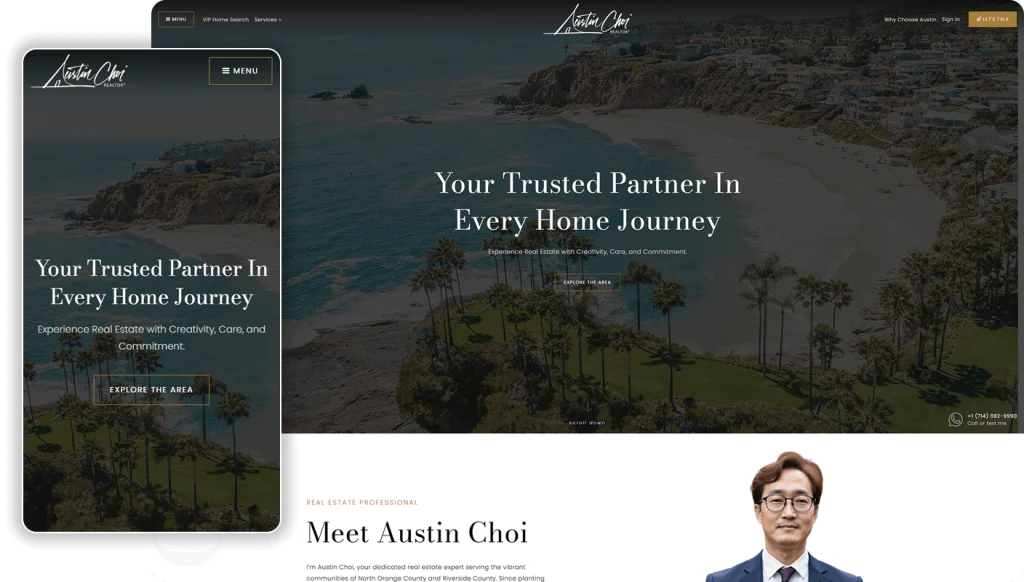
Must-Have Features for a Top Agent Website
The most effective real estate agent websites include specific features that help visitors learn about the agent and take action. These elements work together to create a professional online presence.
1. Branded ‘About’ Page
The About page is typically the most visited page on real estate agent websites. This page helps potential clients understand who you are and why they should work with you.
An effective About page includes:
- A professional photo that shows your personality
- Your real estate background and experience
- Local market knowledge and specialties
- Personal story that connects with clients
- Professional credentials and achievements
2. Property Search with IDX
IDX (Internet Data Exchange) allows you to display MLS listings directly on your website. This feature lets visitors search for homes without leaving your site.
| Basic IDX | Advanced IDX |
|---|---|
| Simple property search | Saved searches and alerts |
| Basic filters | Lead tracking capabilities |
| Standard listing display | Mobile-optimized experience |
| Limited customization | Custom search pages |
The best realtor websites use advanced IDX options that capture leads while providing a helpful search experience.
3. Lead Capture Tools
Effective websites include multiple ways to collect visitor information. Simple contact forms work, but specialized tools often perform better.
- Home valuation tools: These calculators ask homeowners for their address to receive an estimated home value, capturing potential seller leads.
- Neighborhood guides: Downloadable PDF guides about local areas that visitors can access after providing their email address.
- Buyer/seller resources: Checklists, timelines, and other helpful documents that visitors can download in exchange for their contact information.
4. Mobile-Friendly Design
More than 75% of real estate searches now happen on mobile devices. Your website needs to work well on phones and tablets, not just computers.
A mobile-friendly real estate website has:
- Menus that are easy to tap on small screens
- Text that’s readable without zooming
- Forms that work well on touchscreens
- Fast loading times on cellular connections
Inspiring Design Styles for Realtor Websites
Real estate agent website examples show several distinct design approaches. Each style creates a different impression and attracts specific types of clients.
Luxury Style
Luxury real estate websites use minimal design with high-end photography. They often feature:
- Large, dramatic property images
- Lots of white space
- Elegant typography
- Subtle animations
- Dark color schemes with gold or silver accents
This style works well for agents who sell high-end properties and want to create an exclusive feeling.
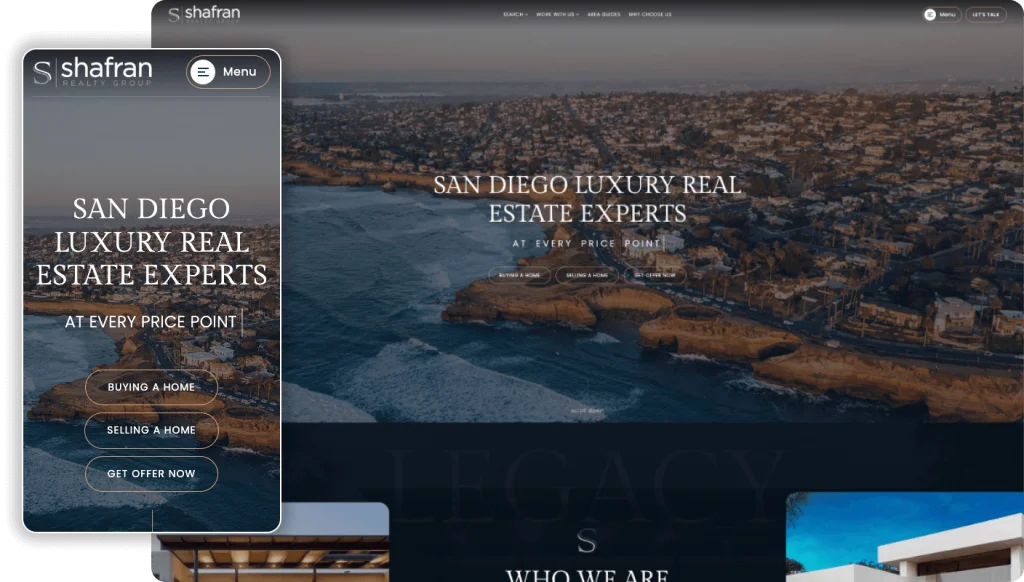
Hyperlocal Expert Style
Websites focused on local expertise highlight the agent’s knowledge of specific neighborhoods. These sites include:
- Interactive maps of the service area
- Detailed neighborhood guides
- Local market statistics
- Community event calendars
- Blog posts about local topics
This approach helps agents establish themselves as the go-to expert for a particular location.
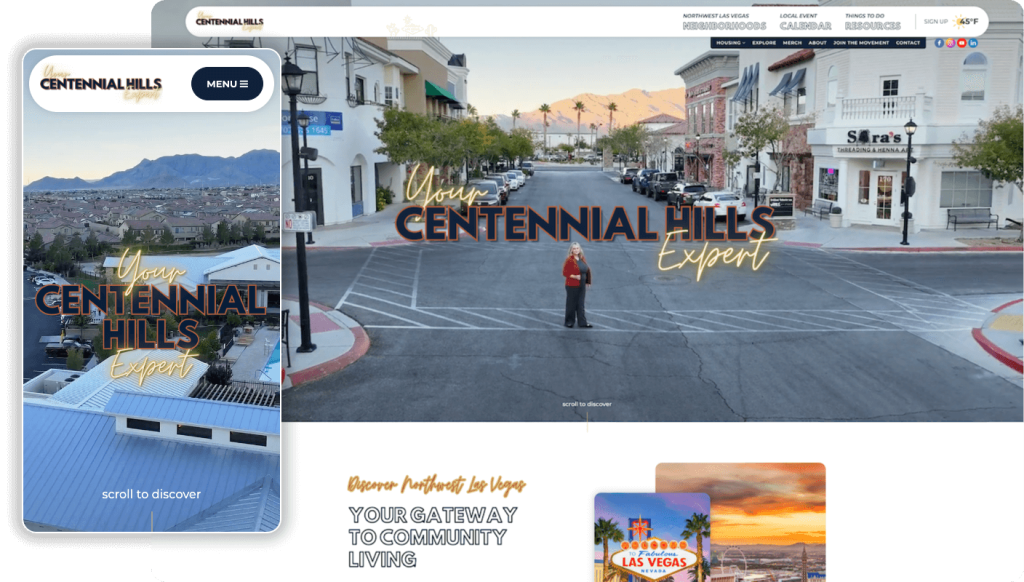
Modern Minimalist Style
Clean, simple websites focus attention on properties and information rather than flashy design. These sites typically have:
- Limited color palette (often black and white with one accent color)
- Simple navigation
- Focused content with minimal text
- Strong typography
- Fast loading speed
This style appeals to busy professionals who appreciate efficiency and clarity.
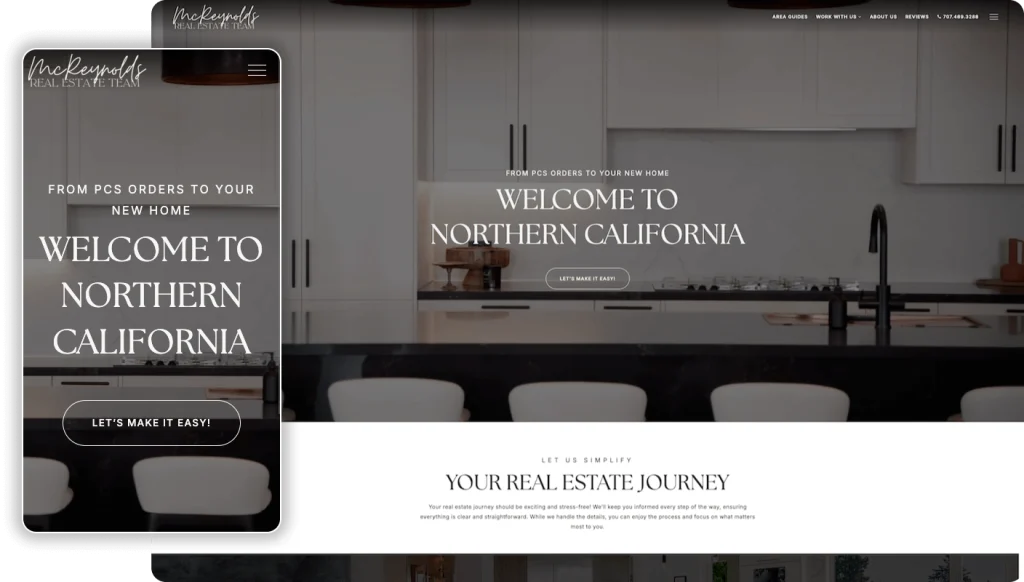
How to Stand Out from Big Real Estate Portals
Large websites like Zillow and Realtor.com have advantages in size and resources, but personal real estate agent websites can offer benefits these portals can’t match.
Focus on Local Knowledge
Big portals cover entire countries, but your website can dive deep into specific neighborhoods. Create detailed content about:
- School information and ratings
- Local restaurants and businesses
- Parks and recreation areas
- Upcoming community events
- Recent sales data for specific streets
This hyperlocal approach helps both buyers (who want to learn about areas) and search engines (which favor detailed local content).
Share Your Personal Approach
Your website can showcase how you work with clients in ways that big portals can’t. Consider creating:
- Case studies of past transactions
- Step-by-step explanations of your buying or selling process
- Video introductions where you speak directly to potential clients
- Client testimonials with specific details about your service
A personal website that highlights your personality and approach creates connections that automated portals can’t match.
Create Custom Property Collections
Instead of just showing all available listings, create curated collections based on lifestyle needs:
- “Best homes for first-time buyers under $300,000”
- “Family-friendly properties with great yards”
- “Homes within walking distance to downtown”
- “Investment properties with positive cash flow potential”
These collections show your understanding of different buyer needs and help visitors find relevant properties quickly.
Steps to Launching Your Personal Real Estate Website
Creating a website involves several key decisions and actions. Here’s how to approach each step:
1. Choose a Platform and Domain
Your website needs both a platform (the software that runs it) and a domain name (the web address people type to find you).
Common platform options include:
| Platform Type | Examples | Best For |
|---|---|---|
| WordPress + Real Estate Plugins | WpResidence, Estatik | Customization and flexibility |
| Dedicated Real Estate Platforms | AgentFire, Luxury Presence | Built-in real estate features |
| All-in-One Solutions | Placester, Real Geeks | Simplicity and integration |
For your domain name, keep it:
- Short and memorable
- Related to your name or location
- Easy to spell
- With a .com extension if possible
Good examples: JaneSmithHomes.com, SeattleRealEstateExpert.com, BuyWithBob.com
2. Plan Essential Content
Before launching, prepare these core website pages:
- Homepage with clear introduction and call-to-action
- About page with your story and credentials
- Property search page with IDX integration
- Area guides for your main neighborhoods
- Contact page with multiple ways to reach you
- Testimonials from past clients
- Resources page with buyer/seller guides
Each page should include professional photos, clear headings, and specific calls to action that tell visitors what to do next.
3. Set Up Lead Capture
Your website needs ways to collect visitor information. The most effective approaches include:
- Value-based lead capture: Offer something useful in exchange for contact information, such as market reports, home buying guides, or neighborhood information.
- Strategic form placement: Position forms at natural decision points, like after property descriptions or at the end of helpful articles.
- Multiple contact options: Include phone, email, text, and social media options so visitors can choose their preferred communication method.
Connect these lead capture tools to your CRM (Customer Relationship Management) system to organize and follow up with new contacts.
Real-World Examples of Effective Agent Websites
Looking at successful real estate agent websites provides inspiration for your own site. Here are standout examples:
Your Centennial Hills Expert
Chelsea’s website focuses entirely on her expertise in the Las Vegas Valley community. Her homepage features:
- Panoramic videos of the local area
- Clickable map showing exact neighborhoods of expertise
- Personable video introduction
- Curated property collections
- Local event calendar
McReynolds Real Estate
Sarah’s website is designed specifically for families requiring military relocation. Key features include:
- Suite of additional services
- Maps and interactive area guides
- Blog with helpful articles
- Portfolio of sales and reviews
- Home valuation calculator for potential sellers
By focusing on a niche market of buyers and sellers, Sarah is able to offer a personalized experience for customers with specific needs.
Caul Group
Tina’s website presents high-end properties with an emphasis on visual presentation:
- Cinematic property videos
- Numerous categories of property listings
- Professional photography galleries
- Featured areas and latest market trends
- Success stories and testimonials
Her website has become a destination for luxury buyers who appreciate the detailed property presentations and exclusive approach.
Boosting Your Website with Local Content
Content that focuses on your specific market area helps both visitors and search engines understand your expertise.
Area Guides with Interactive Elements
Create detailed neighborhood pages that include:
- Recent sales data and price trends
- School information and ratings
- Local amenities and businesses
- Transportation options
- Community events and activities
Adding interactive maps that show properties, schools, and points of interest makes these guides more engaging and useful.
Local Market Updates
Regular updates about your market help establish you as a knowledgeable source:
- Monthly market statistics
- Analysis of local trends
- New development announcements
- Changes in regulations or zoning
- Seasonal buying and selling patterns
These updates can be shared as blog posts, videos, or downloadable reports.
Moving Forward with Your Online Presence
A real estate website is not a one-time project but an ongoing tool that evolves with your business. To keep your site effective:
- Update content regularly with new listings and market information
- Review analytics to see which pages attract the most interest
- Add new neighborhood guides as you expand your expertise
- Refresh your photos and videos periodically
- Test different lead capture approaches to see what works best
Your website serves as the center of your online presence, connecting with your social media, email marketing, and other digital efforts.
For agents looking to create or update their website, AgentFire offers customizable real estate website solutions with built-in IDX, lead capture tools, and local content features. Learn more at https://agentfire.com/schedule-a-demo/.
FAQs About Real Estate Agent Personal Websites
How long does it take to create a real estate agent website?
A basic real estate agent website can be launched in 2-4 weeks, while custom designs with advanced features may require 6-8 weeks.
Do I need technical skills to maintain my real estate website?
Most modern real estate website platforms offer user-friendly interfaces that allow agents to update content without coding knowledge.
What makes a real estate agent website stand out from competitors?
A standout real estate website combines professional design, hyperlocal content, personal branding elements, and user-friendly features.
How can I measure if my real estate website is successful?
Track website traffic, lead form submissions, time on site, and conversion rates through Google Analytics to evaluate performance.
